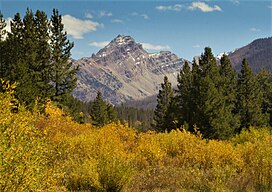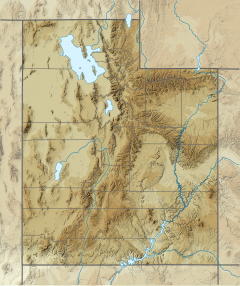Mount Beulah
| Mount Beulah | |
|---|---|
 Northwest aspect | |
| Highest point | |
| Elevation | 12,557 ft (3,827 m)[1] |
| Prominence | 717 ft (219 m)[2] |
| Isolation | 1.41 mi (2.27 km)[3] |
| Coordinates | 40°47′37″N 110°40′55″W / 40.7937472°N 110.6818862°W[4] |
| Geography | |
| Country | United States of America |
| State | Utah |
| County | Summit |
| Protected area | High Uintas Wilderness |
| Parent range | Uinta Mountains Rocky Mountains |
| Topo map | USGS Red Knob |
| Geology | |
| Rock age | Neoproterozoic |
| Rock type | Metasedimentary rock |
| Climbing | |
| Easiest route | class 3 scrambling[3] |
Mount Beulah is a 12,557-foot elevation (3,827 m) mountain summit located in Summit County, Utah, United States.
Description
[edit]Mount Beulah is set within the High Uintas Wilderness on land managed by Uinta-Wasatch-Cache National Forest. It is situated in the Uinta Mountains which are a subset of the Rocky Mountains, and it ranks as the 55th-highest summit in Utah.[2] Neighbors include The Cathedral two miles to the southwest, Yard Peak 3.3 miles to the south-southwest, and Dead Horse Peak is 3.5 miles to the south. Precipitation runoff from the mountain's west slope drains to the Bear River, whereas the east slope drains to the Blacks Fork. Topographic relief is significant as the summit rises over 2,500 feet (760 meters) in one mile from glacial U-shaped valleys on either side. This mountain's toponym has been officially adopted by the United States Board on Geographic Names.
Climate
[edit]Based on the Köppen climate classification, Mount Beulah is located in a subarctic climate zone with cold snowy winters and mild summers.[5] Tundra climate characterizes the summit and highest slopes.
| Climate data for Mount Beulah 40.7678 N, 110.6854 W, Elevation: 12,238 ft (3,730 m) (1991–2020 normals) | |||||||||||||
|---|---|---|---|---|---|---|---|---|---|---|---|---|---|
| Month | Jan | Feb | Mar | Apr | May | Jun | Jul | Aug | Sep | Oct | Nov | Dec | Year |
| Mean daily maximum °F (°C) | 23.6 (−4.7) |
23.7 (−4.6) |
30.2 (−1.0) |
34.8 (1.6) |
43.0 (6.1) |
53.6 (12.0) |
61.4 (16.3) |
59.8 (15.4) |
52.0 (11.1) |
40.8 (4.9) |
29.7 (−1.3) |
23.2 (−4.9) |
39.7 (4.2) |
| Daily mean °F (°C) | 13.3 (−10.4) |
12.4 (−10.9) |
17.7 (−7.9) |
22.0 (−5.6) |
30.6 (−0.8) |
40.9 (4.9) |
48.5 (9.2) |
47.1 (8.4) |
39.6 (4.2) |
29.3 (−1.5) |
19.5 (−6.9) |
13.1 (−10.5) |
27.8 (−2.3) |
| Mean daily minimum °F (°C) | 2.9 (−16.2) |
1.1 (−17.2) |
5.1 (−14.9) |
9.3 (−12.6) |
18.1 (−7.7) |
28.2 (−2.1) |
35.6 (2.0) |
34.4 (1.3) |
27.3 (−2.6) |
17.8 (−7.9) |
9.3 (−12.6) |
3.0 (−16.1) |
16.0 (−8.9) |
| Average precipitation inches (mm) | 4.41 (112) |
4.13 (105) |
3.96 (101) |
4.19 (106) |
3.69 (94) |
2.35 (60) |
2.18 (55) |
2.47 (63) |
3.10 (79) |
3.48 (88) |
3.62 (92) |
4.04 (103) |
41.62 (1,058) |
| Source: PRISM Climate Group[6] | |||||||||||||
See also
[edit]References
[edit]- ^ United States Geological Survey topographical map - Red Knob
- ^ a b "Mount Beulah, Utah". Peakbagger.com. Retrieved August 7, 2022.
- ^ a b "Beulah, Mount - 12,557' UT". listsofjohn.com. Retrieved August 7, 2022.
- ^ "Mount Beulah". Geographic Names Information System. United States Geological Survey, United States Department of the Interior. Retrieved August 7, 2022.
- ^ Peel, M. C.; Finlayson, B. L. & McMahon, T. A. (2007). "Updated world map of the Köppen−Geiger climate classification". Hydrol. Earth Syst. Sci. 11 (5): 1633–1644. Bibcode:2007HESS...11.1633P. doi:10.5194/hess-11-1633-2007. ISSN 1027-5606. S2CID 9654551.
- ^ "PRISM Climate Group, Oregon State University". PRISM Climate Group, Oregon State University. Retrieved October 2, 2023.
To find the table data on the PRISM website, start by clicking Coordinates (under Location); copy Latitude and Longitude figures from top of table; click Zoom to location; click Precipitation, Minimum temp, Mean temp, Maximum temp; click 30-year normals, 1991-2020; click 800m; click Retrieve Time Series button.
External links
[edit]- Mount Beulah (photo): Flickr.com
- Mount Beulah rock climbing: Mountainproject.com


